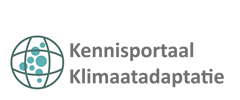West-Brabant Climate Atlas
The West-Brabant Climate Atlas is a first step towards a spatial adaptation strategy for West-Brabant. The Atlas shows how climate change will impact the region. This marks the completion of the “Analysis” step from the “Analysis-Ambition-Action” triple formulated in the Delta Programme.
The subsequent goal is a follow-up project to translate these insights into a spatial adaptation strategy for West-Brabant (“Ambition”). Such a project will be launched in the very near future.
Results
The Atlas has identified a host of climate risks within West-Brabant. Some are relatively local and require local solutions. However, other risks are of a regional nature and closely interrelated with other major societal taskings facing the region as a whole. For example, ambitions for strengthening the agro-food sector, the transition to a circular sustainable economy, or the energy transition coinciding at locations expecting considerable water shortages and waterlogging. Another important liveability tasking, especially in West-Brabant, and also in smaller towns, is heat stress. The degree to which the region manages to address these climate issues will (partly) determine the extent to which West-Brabant will manage to maintain its current economic position within the Netherlands and uphold the current liveability of West-Brabant. Refraining from taking action could potentially cause substantial economic damage.
Lessons to be learnt
- The urgency of climate adaptation is not yet widely acknowledged. There still is too much of a focus on current urban waterlogging.
- In many cases, the capacity available for taking action is still insufficient.
- Frequently, climate adaptation tends to be translated into water issues on the streets and heat stress in the cities, and subsequently addressed by quite concrete measures at the neighbourhood, street, or parcel levels. In short: tackled at the operational level. However, climate adaptation calls for a much broader and more fundamental approach. It also requires action at the strategic and tactical levels. For example, in the fields of spatial planning, public health, and disaster control. The topic needs to be discussed in multiple circles, at every relevant table and with a range of new partners. After all, climate adaptation is one of the four major societal taskings for the decades ahead. The other three are the changing composition of the population, the energy transition, and the transition to a circular economy,
Contact
P. de Rooij
Brabantse Delta district water board
076 56 41 384
p.de.rooij@brabantsedelta.nl
